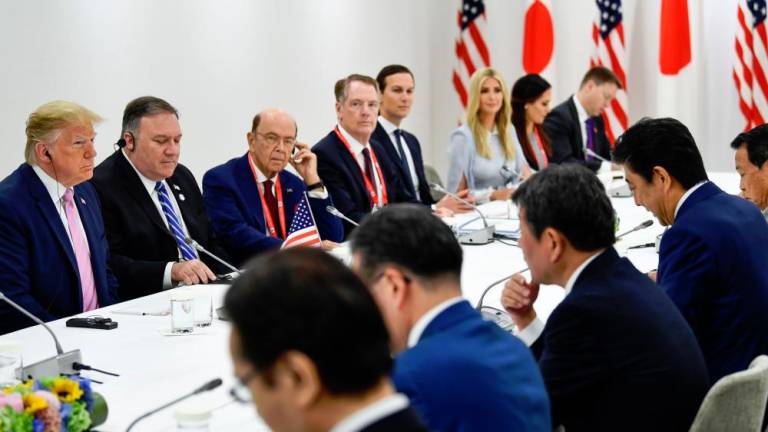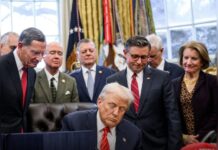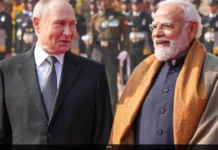OSAKA: World leaders gather in Japan Friday for one of the most high-stakes and fractious G20 meetings in years, with a bruising US-China trade war, geopolitical tensions, and climate change on the agenda. The two-day summit in the city of Osaka will be dominated by trade issues, with all eyes on whether US President Donald Trump and Chinese President Xi Jinping can reach a truce in a dispute that has been hugely damaging for the world economy.
But world leaders will also be seeking to tamp down tensions between Washington and Iran that have led to fears of a new conflict in the Middle East.
And they will look for common ground on climate change, with Japan hoping to unite European leaders who want strong action with an American leadership committed to withdrawing from the Paris climate agreement.
Trump set the tone for the meeting before even arriving in Japan, taking aim at allies and foes alike.
Tweeting from Air Force One, he slammed India, a longstanding partner, for “unacceptable” tariffs on US goods.
“India, for years having put very high Tariffs against the United States, just recently increased the Tariffs even further. This is unacceptable and the Tariffs must be withdrawn,” he wrote.
The US president earlier said Beijing wanted to do a deal because the world’s number-two economy was “going down the tubes”.
Furious at what he sees as an unfair advantage in the trading system, Trump has already hit Beijing with USD 200 billion in levies on Chinese imports and appeared to threaten more.
“You have another USD 325 billion that I haven’t taxed yet — it’s ripe for taxing, for putting tariffs on,” he said in an interview with Fox Business Network.
China meanwhile accused Washington of a “bullying trade tactic” by unilaterally imposing tariffs.
Efforts by the rivals to reach a trade deal fell apart in May, ramping up a spat that has proved a serious headwind for the world economy.
Experts believe there is little chance of a full deal at the G20, but they are hopeful about the prospects for a truce.
Ebrahim Rahbari of CitiFX predicted a 60 per cent chance the leaders will “agree on further negotiations with the eventual goal of a comprehensive agreement but with little immediate effect beyond pushing back… the threat of additional US tariffs on Chinese imports.”
But even a truce is not guaranteed, with the Wall Street Journal reporting Thursday that China will not agree to any deal unless Washington lifts its ban on telecom firm Huawei.
Trade will be far from the only contentious issue on the table, with climate change emerging as another sticking point.
French President Emmanuel Macron has said he wants strong wording in support of climate change action, but Washington is unlikely to back any statement endorsing the Paris climate change deal, from which it plans to withdraw.
Japanese officials say they hope to find common ground, despite Macron insisting the issue is a “red line”, but concede it will be tough.
“The work to consolidate various opinions is expected to be difficult,” a Japanese official admitted to reporters Thursday.
Eyes will also be on German Chancellor Angela Merkel, who arrives in Japan on Friday after suffering a new episode of trembling that sparked fresh questions about her health.
Looming over the talks will be continuing tensions in the Middle East.
Trump said before heading to Japan that any war with Iran “wouldn’t last long.”
That assessment is unlikely to find favour among G20 leaders, with Macron warning Thursday, “there are no short wars.”
When a war begins, he said, “we know when it starts, but rarely when it will end.” AFP







